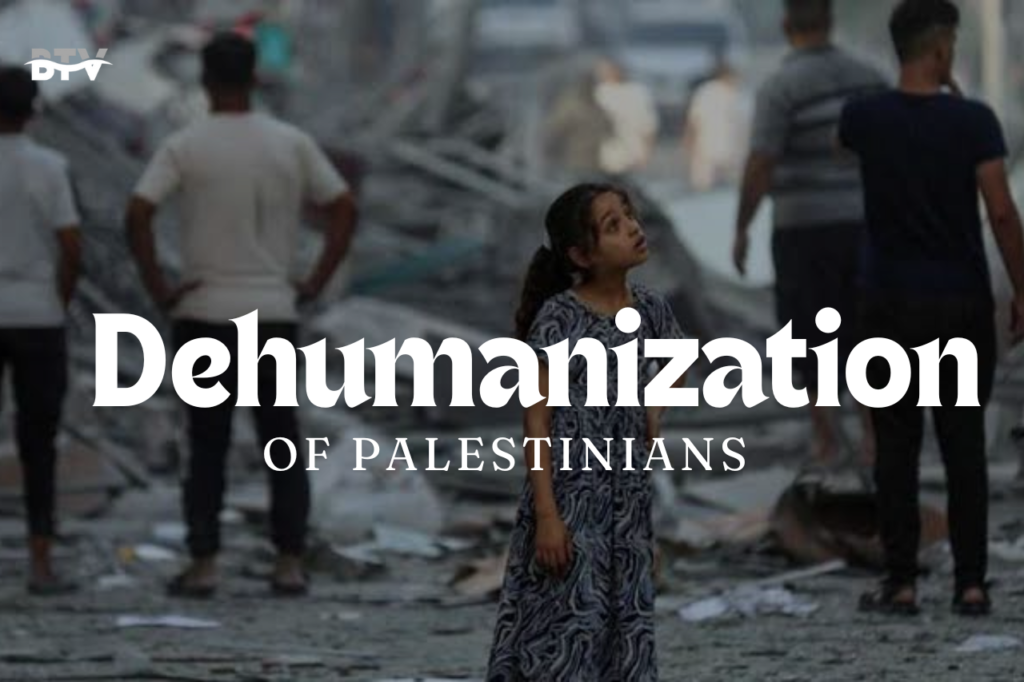Introduction
On March 23, 2025, Israeli forces targeted a convoy of marked ambulances and emergency vehicles in Rafah, Gaza, killing 15 medics and rescuers from the Palestine Red Crescent Society, Civil Defence, and the United Nations. Despite evidence disproving Israel’s claims that the vehicles carried militants, Western media headlines prioritized the Israeli military’s narrative, framing the massacre as a “conflicting account” rather than a war crime. This incident is not an anomaly but a reflection of a systemic issue: the dehumanization of Palestinians through media bias, political rhetoric, and a global culture of impunity. This article examines how the killing of Gaza’s medics exposes the machinery of dehumanization, the role of Western media in legitimizing it, and its devastating consequences for justice and humanity.
1. The Rafah Massacre: A Case Study in Dehumanization
The execution of 15 humanitarian workers in Rafah underscores the normalization of violence against Palestinians. Footage from Rifat Radwan, one of the murdered medics, revealed flashing ambulance lights, clearly marked vehicles, and no weapons. Yet, Israeli forces opened fire, later burying the victims in a mass grave. Autopsies showed execution-style killings—bullets to the head or chest, hands bound.
This incident follows a decades-long pattern:
- Presumption of Guilt: Palestinian civilians, including journalists, doctors, and children, are routinely labeled “militants” posthumously.
- Burden of Proof: Victims’ families must provide forensic evidence to counter state-sponsored lies, a burden rarely imposed on other conflicts.
- Erasure of Context: Israel’s blockade on Gaza, now in its 18th year, has crippled healthcare infrastructure, making medics indispensable—and targets.
The Rafah massacre exemplifies how dehumanization enables atrocity: when Palestinians are stripped of humanity, their deaths become disputable statistics rather than tragedies.
2. Western Media’s Role in Perpetuating Bias
Western media outlets often act as amplifiers of Israeli state narratives. Studies by the Arab Center Washington DC and Media Tenor reveal systemic disparities:
- Source Imbalance: Israeli officials are quoted 3–5 times more frequently than Palestinians in major outlets like BBC and CNN.
- Passive Framing: Headlines like “Clashes Erupt After Israeli Strike” obscure agency, avoiding terms like “occupation” or “apartheid.”
- Epistemic Injustice: Palestinian testimonies are dismissed as “emotional” or “biased,” while Israeli claims are presented as objective.
Case in Point: After the Rafah killings, Reuters initially reported Israel’s claim about “unmarked vehicles” without verifying footage. This uncritical repetition legitimizes violence and entrenches dehumanization.
3. The Machinery of Dehumanization: Historical and Structural Context
Dehumanization is not incidental but institutionalized. It serves three functions:
- Moral Justification for Violence: By framing Palestinians as “terrorists,” Israel justifies disproportionate force. Over 33,000 Palestinians have been killed since 2023, including 14,500 children.
- Political Expediency: U.S. and EU complicity—through arms sales and vetoes at the UN—relies on portraying Palestinians as threats.
- Cultural Erasure: From Hollywood to textbooks, Palestinians are either invisible or depicted as violent, denying their history and humanity.
This machinery dates to 1948, when Zionist narratives labeled Palestinians “absent” to legitimize mass displacement. Today, digital tools like AI-powered surveillance in Gaza extend this erasure into the algorithmic age.
4. Psychological and Societal Repercussions
The psychological toll on Palestinians is profound:
- Moral Injury: Survivors grapple with guilt and helplessness, knowing the world questions their suffering.
- Collective Trauma: Over 70% of Gazans have lost a family member; 80% report symptoms of depression.
- Global Apathy: Dehumanization normalizes indifference, enabling donor fatigue and political inaction.
For international observers, biased media framing creates a “compassion gap.” While Ukrainian refugees are welcomed, Palestinian refugees face border closures and xenophobia.
5. Pathways to Justice and Accountability
Breaking the cycle of dehumanization requires systemic change:
- Media Accountability: Outlets must adopt ethical guidelines for conflict reporting, prioritizing Palestinian voices and historical context.
- Legal Action: Prosecuting war crimes under the ICC and leveraging universal jurisdiction laws.
- Grassroots Solidarity: Movements like BDS (Boycott, Divestment, Sanctions) challenge institutional complicity.
- Narrative Resistance: Amplifying Palestinian art, literature, and oral histories to reclaim agency.
The UN’s Independent International Commission of Inquiry on Gaza has already called for sanctions against Israel. Public pressure can turn these recommendations into action.
CSS Student Guide: Key Themes and Exam Topics
For students preparing for competitive exams like the CSS (Central Superior Services), this article offers critical insights into:
1. Media Ethics:
- The role of Western media in shaping public perception of conflicts.
- Compare coverage of Ukraine vs. Palestine to analyze bias.
2. International Humanitarian Law (IHL):
- Legal protections for medical personnel under the Geneva Conventions.
- Challenges in enforcing IHL in asymmetrical conflicts.
3. Psychological Warfare:
- How dehumanization is weaponized to justify occupation and violence.
4. Geopolitical Dynamics:
- U.S. and EU roles in perpetuating the Israel-Palestine conflict through military aid and veto power.
5. Human Rights Advocacy:
- Strategies for NGOs to document war crimes and lobby for accountability.
Essay Questions:
- “Media bias is not just a journalistic failure but a human rights issue.” Discuss.
- Analyze the role of dehumanization in prolonging the Israel-Palestine conflict.
Conclusion
The killing of Gaza’s medics is a microcosm of a broader truth: dehumanization is the thread weaving together occupation, media bias, and global apathy. Until Palestinians are seen as fully human—worthy of grief without verification—justice remains elusive. For CSS aspirants and global citizens alike, confronting this truth is the first step toward dismantling the machinery of oppression. As Ahmed Najar writes, “We do not just bury our dead; we fight to have their deaths recognized.” The fight for recognition is, ultimately, a fight for a world where no life is disposable.




